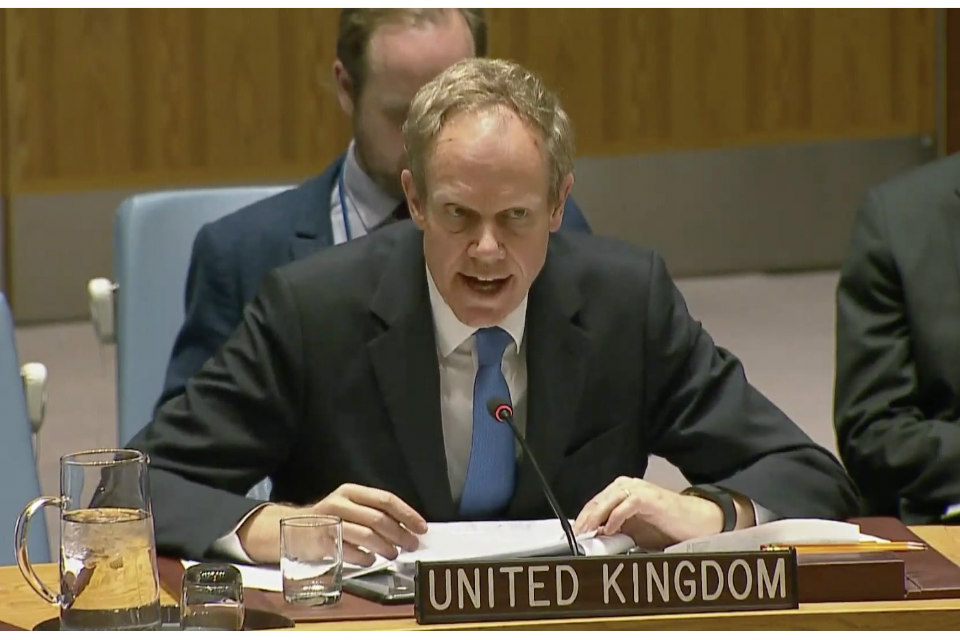"As our world becomes more connected, so too will the challenges that we face. So to succeed, we must confront them together"
Statement by Ambassador Matthew Rycroft at the Security Council Open Debate on Addressing Complex Contemporary Challenges to International Peace and Security.

Thank your Mr President for the floor and for holding this important debate. It gives us the opportunity both to reflect on the past year and to look ahead to the year ahead.
I want to thank the Secretary-General for his excellent briefing, which clearly demonstrates that these contemporary challenges are highly relevant, not just to the Security Council, or the rest of the United Nations, but indeed to the whole world.
The Security Council has engaged this year on a number of conventional threats to peace and security. North Korea‘s nuclear weapons programme, Da’esh in Syria, or Iraq.
These conventional threats have been fuelled by contemporary challenges that we all face. North Korea’s illegal missile programme is partly funded by modern slavery. Syrian terrorists spread their poisonous messages and plan transnational attacks using the internet.
In fact, it is hard to find a situation on our agenda where peace and security dynamics are not bound up with contemporary transnational challenges. The illicit trading of natural resources in the Democratic Republic of Congo. The enslavement of migrants in Libya. Smuggling in the Sahel. Drugs flows in Colombia. Ecological and climate stress in the Lake Chad Basin. The list goes on.
So if we want to tackle these conventional threats effectively, the UN and its member states must also consider contemporary transnational challenges. These challenges don’t care about national borders. As our world becomes more connected, so too will the challenges that we face. So to succeed, we must confront them together.
To counter these challenges we must act at home, in partnership, and multilaterally. We cannot hope to prevent conflict, sustain peace or enable development otherwise.
I would like to illustrate the action that the United Kingdom is taking in each of these areas with three examples.
Firstly, at home, we are tackling illicit financial flows. Globally these are estimated to be up to $1.6 trillion a year. Our National Crime Agency believes that tens or even hundreds of billions of dollars are laundered through the United Kingdom. They include the proceeds of armed groups, terrorists, organised crime and corrupt officials in predatory states. These proceeds fuel further conflict and are a barrier to peace and stability. This year we passed the Criminal Finances Act which ensures that we are better able to tackle this illicit financing and consequentially promote peace.
Secondly, through our partnerships we are tackling climate change, recognised by the Security Council as a factor that can aggravate existing threats to international peace and security. We have partnered with others to improve their resilience to the impacts of climate change. In one project, we support 13 countries to integrate risk reduction and climate adaptation into government policies and institutions. This reduces their instability and safeguards our collective security.
Finally, and perhaps most importantly, we are acting multilaterally, including here at the United Nations. Consider the universal issues of modern slavery and human trafficking. We know that these appalling human rights abuses are most prevalent in conflict zones, and that they feed instability. We have sought to respond, and will continue to do so, through the Security Council, the General Assembly and the Human Rights Council.
Working through these multilateral organisations allows us to connect the dots and better address the complex and multi-faceted challenges that we are confronted with. We must all endeavour to do more, and do it better, here at the UN.
If the UN itself is to rise to the challenge we must support the Secretary-General in his ambitious reform programme to join the UN up so that it can act more effectively and more efficiently at the heart of a rules-based international system.
The risk of too much reform or too rapid reform is dwarfed by the risk of not enough reform or too slow reform. We need to get on with the reform to sustain peace better, to meet the sustainable development goals, and to protect the human rights that we cherish. Success in these interlinked areas depends on our ability to escape silos and tackle the challenges coherently.
Mr President, I have a simple wish for the year ahead. I hope that as member states deliberate over the Secretary-General’s reform proposals they remember that, as we sit and debate this important issue, millions of far less fortunate people confront insecurity, forced displacement, rights violations, hunger, and poverty as a single reality. They do not recognise them as isolated issues. Neither should we.
So let us take responsibility at home, build partnerships overseas and, most importantly, enable the UN to respond ever more effectively to these challenges so we can achieve a safer and more secure world for all.
Thank you.